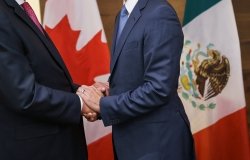At State, Clinton Has Plenty to Tackle
Secretary Clinton has the second-best job in Washington, but these days, the bureaucratic landscape and state of the world have conspired to make her job even tougher than it would be under normal circumstances. Getting into the Secretary of State Hall of Fame won't be easy, writes Public Policy Scholar Aaron David Miller.
(This story originally appeared in Politico on Tuesday, July 28.)
Having worked for a half-dozen secretaries of state, I feel a certain affinity (and sympathy) for Hillary Clinton. She has the second-best job in Washington, but after six months, I'm not sure whether to offer her congratulations or condolences. These days, the bureaucratic landscape and state of the world have conspired to make her job even tougher than it would be under normal circumstances. Indeed, getting into the Secretary of State Hall of Fame won't be easy.
There's no magic formula to determine what makes an effective secretary of state. Besides Fortuna and the contingencies of history, of course, there are at least four factors that go into the mix. The first is a formidable physical and intellectual persona that gets people's attention. When a secretary of state walks into a room, his or her interlocutors should be on the edge of their seats, worried about being outmaneuvered, not comfortably situated in the back of their chairs thinking about doing the maneuvering.
Second, you need to be tough and at times devious to navigate the bureaucratic and political maze at home, not to mention coping with the rough-and-tumble world of foreign policy.
Third, the best secretaries of state (both Henry Kissinger and James Baker come to mind) possess the negotiator's mind-set. For them, foreign policy was a kind of chessboard where the search for the right moves on strategies and tactics became second nature. Effective secretaries of state think instrumentally; they are great negotiators; they know how to get out of tough spots and, more important, how not to get into them in the first place.
Fourth, an effective secretary of state must have the president's ear and he must have her back at home and abroad. The relationship must be close and be perceived to be close—what you might call the secretary's reputation in town. The point is to put the secretary in a position to carry real weight and presidential authority with Congress, in the Cabinet and in the policy debates. Indeed, in this case, the secretary must be the White House's woman at the State Department, and not the State Department's woman at the White House.
Of these four qualities, Clinton clearly has two: She's a superstar with real presence, and she's plenty tough—I'd bet devious when she needs to be. It's the latter two that are problematic: how she fits into the president's foreign policy team and her capacity to be effective in a hopelessly complicated world.
Six months into the administration (not a long time, to be sure), power in foreign policy seems to be emanating from and flowing to the White House. Whatever the future holds for President Barack Obama, he's clearly aspiring to be a transformative figure, and he is dominating the foreign policy agenda. The president is everywhere, a kind of Energizer Bunny of foreign policy—in Cairo, creating a new agenda for the Arab and Muslim world; in Normandy, France, and Buchenwald, steeping himself in the power of history; in Moscow, negotiating arms control; at the G-8, working the allies. And his dominance in foreign policy is likely to continue. As the domestic agenda becomes even trickier in health care and the economy, Obama, like his predecessors, may well seek refuge, relief and freedom of action in the affairs of diplomacy.
The president's glow has already illuminated a bureaucratic landscape that isn't particularly secretary-of-state-friendly. On Iran, Afghanistan, Iraq and the Arab-Israeli issue, policy seems to be in the hands of secretary of state-like envoys, increasingly overseen by the National Security Council.
On the other hand, with America engaged in two wars (Iraq and Afghanistan) as well as in a third (whatever it's now called) against terrorists, the Pentagon and its military proconsuls have carved out a bigger role on policy and budget, all of which seem to come at the expense of the Department of State.
Perhaps Clinton's biggest challenge is that America has inherited a world of long and nasty moves abroad that seem to defy quick, easy or perhaps any diplomatic solutions at all. It's a world by any standard that's more prone to be managed rather than to be resolved or saved by high-wire summits and peace treaties. Iraq, Afghanistan, Iran and the Arab-Israeli issue represent one galactic headache after another. America seems to be in an investment trap in issues that it can't run away from but can't fix, either.
Still, the most consequential secretaries have been associated with the big ideas, the tough crises and the diplomatic breakthroughs that they own and shape. Indeed, by definition, beavers build dams, teenagers talk on the phone and effective secretaries of state manage crises and solve big problems. And in the end, in the cruel and unforgiving world that is Washington, fairly or not, Secretary of State Clinton may well be judged accordingly if she doesn't.










